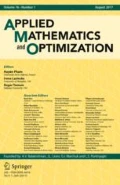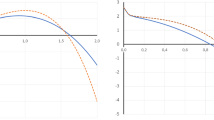Abstract
We study a nonlinear system of partial differential equations arising in macroeconomics which utilizes a mean field approximation. This system together with the corresponding data, subject to two moment constraints, is a model for debt and wealth across a large number of similar households, and was introduced in a recent paper of Achdou et al. (Philos Trans R Soc Lond Ser A 372(2028):20130397, 2014). We introduce a relaxation of their problem, generalizing one of the moment constraints; any solution of the original model is a solution of this relaxed problem. We prove existence and uniqueness of strong solutions to the relaxed problem, under the assumption that the time horizon is small. Since these solutions are unique and since solutions of the original problem are also solutions of the relaxed problem, we conclude that if the original problem does have solutions, then such solutions must be the solutions we prove to exist. Furthermore, for some data and for sufficiently small time horizons, we are able to show that solutions of the relaxed problem are in fact not solutions of the original problem. In this way we demonstrate nonexistence of solutions for the original problem in certain cases.
Similar content being viewed by others
References
Achdou, Y., Buera, F.J., Lasry, J.-M., Lions, P.-L., Moll, B.: Partial differential equation models in macroeconomics. Philos. Trans. R. Soc. Lond. Ser. A 372(2028), 20130397 (2014)
Achdou, Y., Han, J., Lasry, J.-M., Lions, P.-L., Moll, B.: Income and wealth distribution in macroeconomics: a continuous-time approach. NBER Working Paper Series (2017)
Adams, R.A., Fournier, J.J.F.: Sobolev Spaces, Pure and Applied Mathematics, vol. 140, 2nd edn. Elsevier/Academic Press, Amsterdam (2003)
Aiyagari, S.R.: Uninsured idiosyncratic risk and aggregate saving. Q. J. Econ. 109(3), 659–684 (1994)
Ambrose, D.M.: Well-posedness of vortex sheets with surface tension. SIAM J. Math. Anal. 35(1), 211–244 (2003). (electronic)
Ambrose, D.M.: Small strong solutions for time-dependent mean field games with local coupling. C. R. Acad. Sci. Paris 354, 589–594 (2016)
Ambrose, D.M.: Strong solutions for time-dependent mean field games with non-separable Hamiltonians. J. Math. Pures Appl. (2016)
Ambrose, D.M.: Existence theory for non-separable mean field games in Sobolev spaces (2018). Preprint. arXiv:1807.02223. Submitted to Math. Ann
Bewley, T.: Stationary monetary equilibrium with a continuum of independently fluctuating consumers. Contributions to mathematical economics in honor of Gérard Debreu, 79 (1986)
Cardaliaguet, P., Graber, P.J., Porretta, A., Tonon, D.: Second order mean field games with degenerate diffusion and local coupling. NoDEA Nonlinear Differ. Equ. Appl. 22(5), 1287–1317 (2015)
Cirant, M., Gianni, R., Mannucci, P.: Short time existence for a general backward-forward parabolic system arising from mean-field games (2018). Preprint. arXiv:1806.08138
Constantin, A., Escher, J.: Wave breaking for nonlinear nonlocal shallow water equations. Acta Math. 181(2), 229–243 (1998)
Feller, W.: On boundaries and lateral conditions for the Kolmogorov differential equations. Ann. Math. 2(65), 527–570 (1957)
Gomes, D.A., Pimentel, E.: Time-dependent mean-field games with logarithmic nonlinearities. SIAM J. Math. Anal. 47(5), 3798–3812 (2015)
Gomes, D.A., Pimental, E., Sánchez-Morgado, H.: Time-dependent mean-field games in the superquadratic case. arXiv:1311.6684v3 (2014)
Gomes, D.A., Pimentel, E.A., Sánchez-Morgado, H.: Time-dependent mean-field games in the subquadratic case. Commun. Partial Differ. Equ. 40, 40–76 (2015)
Huang, M., Malhamé, R.P., Caines, P.E.: Large population stochastic dynamic games: closed-loop McKean-Vlasov systems and the Nash certainty equivalence principle. Commun. Inf. Syst. 6(3), 221–251 (2006)
Huang, M., Caines, P.E., Malhamé, R.P.: Large-population cost-coupled LQG problems with nonuniform agents: individual-mass behavior and decentralized \(\epsilon \)-Nash equilibria. IEEE Trans. Autom. Control 52(9), 1560–1571 (2007)
Huggett, M.: The risk-free rate in heterogeneous-agent incomplete-insurance economies. J. Econ. Dyn. Control 17(5–6), 953–969 (1993)
Lasry, J.-M., Lions, P.-L.: Jeux à champ moyen. I. Le cas stationnaire. C. R. Math. Acad. Sci. Paris 343(9), 619–625 (2006)
Lasry, J.-M., Lions, P.-L.: Jeux à champ moyen. II. Horizon fini et contrôle optimal. C. R. Math. Acad. Sci. Paris 343(10), 679–684 (2006)
Lasry, J.-M., Lions, P.-L.: Mean field games. Jpn. J. Math. 2(1), 229–260 (2007)
Majda, A.J., Bertozzi, A.L.: Vorticity and Incompressible Flow. Cambridge Texts in Applied Mathematics, vol. 27. Cambridge University Press, Cambridge (2002)
Miller, R.E.: Extension theorems for homogenization on lattice structures. Appl. Math. Lett. 5(6), 73–78 (1992)
Porretta, A.: On the planning problem for a class of mean field games. C. R. Math. Acad. Sci. Paris 351(11–12), 457–462 (2013)
Porretta, A.: On the planning problem for the mean field games system. Dyn. Games Appl. 4(2), 231–256 (2014)
Porretta, A.: Weak solutions to Fokker-Planck equations and mean field games. Arch. Ration. Mech. Anal. 216(1), 1–62 (2015)
Acknowledgements
The author gratefully acknowledges support from the National Science Foundation through Grants DMS-1515849 and DMS-1907684. The author is also grateful to the anonymous referees for a number of helpful comments.
Author information
Authors and Affiliations
Corresponding author
Ethics declarations
Conflict of interest
The authors declare that they have no conflict of interest.
Additional information
Publisher's Note
Springer Nature remains neutral with regard to jurisdictional claims in published maps and institutional affiliations.
Rights and permissions
About this article
Cite this article
Ambrose, D.M. Existence Theory for a Time-Dependent Mean Field Games Model of Household Wealth. Appl Math Optim 83, 2051–2081 (2021). https://doi.org/10.1007/s00245-019-09619-5
Published:
Issue Date:
DOI: https://doi.org/10.1007/s00245-019-09619-5



